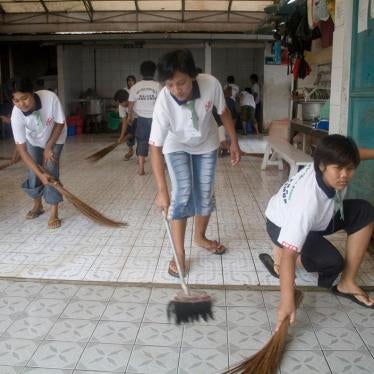(New York) - The Sri Lankan government's proposed regulation banning mothers of young children from migrating abroad for work discriminates against women and endangers the welfare of their children, Human Rights Watch said today.
On March 7, Sri Lanka’s ministerial cabinet approved a proposal by the Minister for Child Development and Women’s Empowerment that would ban women with children under 5 years of age from emigrating for work. The regulation would also require mothers with children aged 5 or older to obtain approval from a government committee after submitting proof that they can provide appropriate caretakers for their children.
Human Rights Watch called on the Sri Lankan government to withdraw the regulation, which has not yet been implemented.
“This policy blatantly discriminates against women and threatens the well-being of their children,” said LaShawn R. Jefferson, director of the Women’s Rights Division at Human Rights Watch. “It would prevent many mothers from supporting their children by banning them from the only form of work they can find.”
Sri Lanka has obligations under its constitution and international law to protect women from discrimination, including in employment. The Sri Lankan Constitution provides, in article 12, that no citizen may be discriminated against on the basis of sex.
International human rights treaties to which Sri Lanka is a party also ban discrimination against women. The Convention on the Elimination of All Forms of Discrimination against Women, which Sri Lanka ratified in 1981, requires states to eliminate discrimination against women in the field of employment, including by providing the right to free choice of profession and employment.
More than 660,000 Sri Lankan women are working as domestic workers abroad. To support themselves and their families, many Sri Lankan women migrate to the Middle East on temporary contracts as domestic workers. The majority of Sri Lankan migrant workers are women and their remittances make valuable contributions to the country’s economy. In 2006, workers’ remittances amounted to US$2.2 billion, representing Sri Lanka’s second-highest form of foreign-exchange earnings and equivalent to over 9 percent of the country’s gross domestic product.
While remittances are critical to Sri Lanka’s economic strategy for poverty reduction, the Sri Lankan government has expressed concern about the social impact of migration on children who are unable to accompany their mothers abroad. In a press release issued on March 8, the government justified the policy on the grounds that migrant women’s children “have become helpless and vulnerable, and lack nutrition and healthcare.”
In October and November, scores of migrant domestic workers interviewed in Sri Lanka told Human Rights Watch that they migrate because of financial necessity and that their children’s survival depends on incomes earned abroad.
“If the Sri Lankan government is genuinely committed to improving the well-being of migrant workers’ children, it should set up social-service programs to identify and address those needs,” said Jefferson. “Stopping mothers from earning a living abroad will not result in improved care for their children back home.”
Human Rights Watch urged the Sri Lankan government to rescind the policy immediately. The Sri Lankan government should also consult with migrant, community, and women’s groups to enhance economic and educational opportunities for women so that domestic workers can migrate based on choice rather than desperation.







